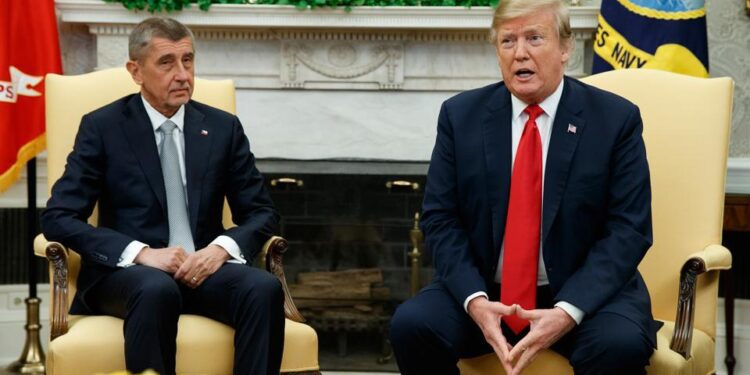Czech billionaire Andrej Babis, often dubbed the “Czech Trump” for his populist style and business background, is poised for a political comeback as he aims to reclaim the prime ministership. Following recent election gains, Babis’s ANO party is reemerging as a dominant force in Czech politics, signaling a potential shift in the country’s government amid ongoing debates over economic policy and European Union relations.
Czech Populist Leader Andrej Babis Poised for Political Return
After a period of political turbulence, Andrej Babis is on track to reclaim his position as the Czech Republic’s prime minister. Known for his populist approach and compared by many to former U.S. President Donald Trump, Babis has regained momentum by rallying voters frustrated with the status quo. His appeal cuts across various demographics, particularly among those seeking a shift away from traditional party politics. This resurgence marks a significant pivot in Czech political dynamics, highlighting ongoing divisions within the electorate.
Key factors contributing to his comeback include:
- Economic promises: Focus on boosting small businesses and increasing social benefits.
- Nationalist rhetoric: Emphasis on protecting Czech sovereignty against EU influence.
- Media outreach: Strategic use of social media platforms to mobilize supporters.
| Year | Election Result | Percentage of Vote |
|---|---|---|
| 2017 | Prime Minister Elected | 29.6% |
| 2021 | Lost Premiership | 27.1% |
| 2024 (Projected) | Potential Comeback | 33.0% |
Analyzing the Impact of Babis’s Comeback on Czech Domestic and Foreign Policy
Andrej Babis’s anticipated return to power signals potential shifts in the Czech Republic’s policy landscape, both domestically and internationally. On the home front, his outspoken populist approach could translate into renewed focus on social welfare programs, but also tighter control over media and judicial institutions. Babis’s tenure previously exhibited a blend of economic pragmatism and nationalist rhetoric, which may translate into policies prioritizing Czech sovereignty over deeper European integration. Key areas to monitor include:
- Economic policy: Potential stimulus packages versus austerity measures.
- Judicial independence: Prospects for reforms or increased government influence.
- Media landscape: Implications for press freedom and information control.
On the foreign policy front, Babis’s return might reorient the Czech Republic towards more cautious engagement with the European Union and NATO, emphasizing national interests and skeptical rhetoric similar to his prior “Czech Trump” comparisons. Balancing relations with Russia and China will be a delicate matter, potentially aligning more with economic pragmatism than ideological alignment. A brief overview of anticipated shifts is presented below:
| Policy Area | Previous Stance | Potential Direction | ||
|---|---|---|---|---|
| EU Relations | Pragmatic but critical | Emphasis on sovereignty, cautious engagement | ||
| NATO | Supportive yet non-interventionist | NATO | Supportive yet non-interventionist | Cautious partnership, selective involvement |
| Russia Relations | Pragmatic engagement with economic focus | Balanced approach, economic pragmatism over ideology | ||
| China Relations | Opportunistic economic cooperation | Continued economic ties with cautious diplomacy |
Overall, Babis’s comeback may reinforce nationalist tendencies and pragmatic economic calculations, potentially challenging the Czech Republic’s alignment with broader EU policies while navigating complex global partnerships.
Let me know if you would like me to help with anything else, such as adding visuals, summaries, or further analysis!
Strategic Recommendations for Navigating the Changing Political Landscape in the Czech Republic
Amidst the resurgence of Andrej BabiŇ°, businesses and political stakeholders must recalibrate their strategies to effectively operate within the evolving Czech political milieu. Understanding the interplay between BabiŇ°’s populist approach and traditional political structures is crucial for anticipating policy shifts, regulatory changes, and public sentiment. Active engagement with local legislative bodies and cultivating flexible governmental relations will allow entities to better navigate new priorities such as economic nationalism, media influence, and EU relations that are poised to redefine the Czech Republic’s domestic and international posture.
To capitalize on emerging opportunities and mitigate risks, it is recommended to implement the following strategic actions:
- Enhance political risk assessment frameworks by incorporating scenario planning that reflects potential policy volatility under BabiŇ°’s leadership.
- Invest in local partnerships to reinforce market resilience and adapt swiftly to regulatory reforms aimed at both domestic and foreign businesses.
- Monitor public discourse and media narratives intensified by BabiŇ°’s media influence to better gauge shifts in public opinion and sentiment.
- Leverage EU engagement channels proactively, anticipating possible frictions or recalibrations in the Czech Republic’s stance toward broader European policies.
| Focus Area | Strategic Action | Expected Outcome |
|---|---|---|
| Regulatory Adaptation | Scenario-based policy forecasting | Faster compliance and reduced disruption |
| Political Networks | Stakeholder coalition building | Increased influence and access |
| Public Perception | Media monitoring and narrative alignment | Improved reputation management |
| EU Relations | Proactive diplomatic engagement | Mitigated cross-border policy risks |
The Way Forward
As Andrej Babis positions himself for a political comeback, the Czech Republic faces a pivotal moment that could reshape its government and policy direction. His return to the premiership would mark a significant development in the nation’s ongoing political dynamics, underscoring the complex interplay between populism and traditional party politics in Central Europe. Observers will be closely watching how this potential shift influences both domestic affairs and the Czech Republic’s role within the broader European context.
















